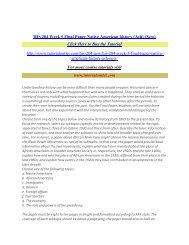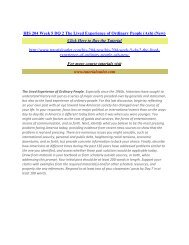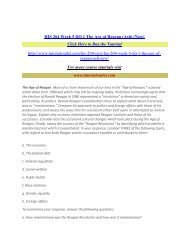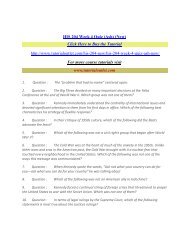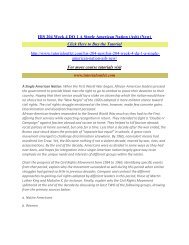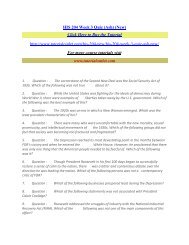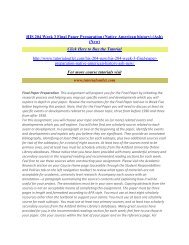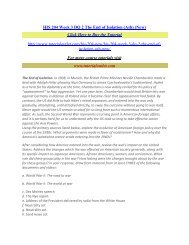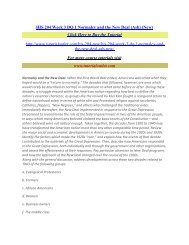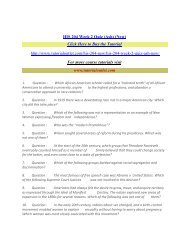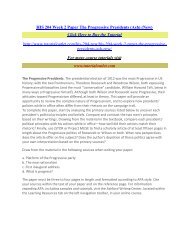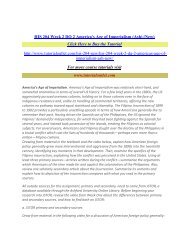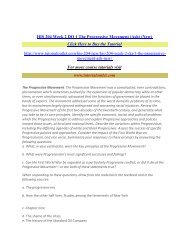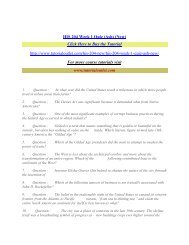HIS 204 Week 4 DQ 2 Cold War (Ash) (New) / Tutorialoutlet
For more course tutorials visit www.tutorialoutlet.com Cold War. After the Second World War, the US embarked on what came to be known as the Cold War against the Soviet Union. Although the two sides never fought against each other directly, the Cold War nonetheless erupted into violence at times in places like Vietnam, Korea, and Afghanistan. As the US grew more activist and interventionist in its foreign policy, the domestic government also grew in power and in its role in the people’s lives. Explain the origins of the Cold War and describe how different presidential administrations, from Truman to Nixon, handled Cold War affairs. Address the ways in which the presidents responded to the perceived threat of Soviet expansion, and explain how these approaches involved the US in conflicts in Vietnam and Korea. Consider, also, the ways in which the US intervened in the affairs of smaller nations such as Iran. Finally, explore how the Cold War changed America’s domestic society, focusing on issues such as the role of the government in people’s lives, the Red Scare, the return of domesticity, and growing distrust toward the federal government. Summarize your thoughts on the issues above by answering the following questions: a. Why did the Cold War start and how did it develop over its first three decades? b. What were its most important effects at home and abroad? When responding to these prompts, draw from the material in ONE of the following videos: a. The post-war years b. Superpowers collide c. 1930-1960 Also, draw from the material in THREE of the following documents: a. Electronic briefing book no. 28: The secret CIA history of the Iran coup, 1953 b. Farewell address c. Protestant-Catholic-Jew: An essay in American religious sociology (1960) d. The Tonkin Gulf incident; 1964
For more course tutorials visit
www.tutorialoutlet.com
Cold War. After the Second World War, the US embarked on what came to be known as the Cold War against the Soviet Union. Although the two sides never fought against each other directly, the Cold War nonetheless erupted into violence at times in places like Vietnam, Korea, and Afghanistan. As the US grew more activist and interventionist in its foreign policy, the domestic government also grew in power and in its role in the people’s lives.
Explain the origins of the Cold War and describe how different presidential administrations, from Truman to Nixon, handled Cold War affairs. Address the ways in which the presidents responded to the perceived threat of Soviet expansion, and explain how these approaches involved the US in conflicts in Vietnam and Korea. Consider, also, the ways in which the US intervened in the affairs of smaller nations such as Iran. Finally, explore how the Cold War changed America’s domestic society, focusing on issues such as the role of the government in people’s lives, the Red Scare, the return of domesticity, and growing distrust toward the federal government. Summarize your thoughts on the issues above by answering the following questions:
a. Why did the Cold War start and how did it develop over its first three decades?
b. What were its most important effects at home and abroad?
When responding to these prompts, draw from the material in ONE of the following videos:
a. The post-war years
b. Superpowers collide
c. 1930-1960
Also, draw from the material in THREE of the following documents:
a. Electronic briefing book no. 28: The secret CIA history of the Iran coup, 1953
b. Farewell address
c. Protestant-Catholic-Jew: An essay in American religious sociology (1960)
d. The Tonkin Gulf incident; 1964
You also want an ePaper? Increase the reach of your titles
YUMPU automatically turns print PDFs into web optimized ePapers that Google loves.



